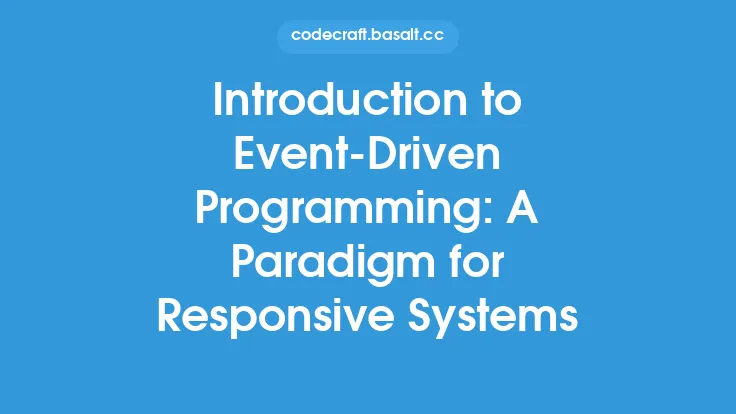Modular programming is a fundamental approach to software development that emphasizes the creation of independent, self-contained modules that can be easily combined to form a complete system. This approach has been widely adopted in the software industry due to its numerous benefits, including improved maintainability, scalability, and reusability. In this article, we will delve into the basics of modular programming, exploring its core principles, advantages, and applications.
History of Modular Programming
The concept of modular programming dates back to the 1960s, when software systems were becoming increasingly complex and difficult to manage. The need for a more structured approach to software development led to the development of modular programming principles. The idea was to break down a large system into smaller, independent modules, each with its own specific function or set of functions. This approach allowed developers to work on individual modules without affecting the entire system, making it easier to develop, test, and maintain software.
Key Principles of Modular Programming
Modular programming is based on several key principles, including separation of concerns, abstraction, and encapsulation. Separation of concerns refers to the idea of breaking down a system into smaller modules, each responsible for a specific aspect of the system's functionality. Abstraction involves hiding the implementation details of a module from the rest of the system, allowing developers to change or replace the module without affecting other parts of the system. Encapsulation refers to the idea of bundling data and its associated methods into a single unit, making it easier to manage and maintain.
Modular Programming Paradigms
There are several programming paradigms that support modular programming, including object-oriented programming (OOP), functional programming, and procedural programming. OOP is particularly well-suited to modular programming, as it allows developers to create self-contained objects that encapsulate data and behavior. Functional programming, on the other hand, emphasizes the use of pure functions, which can be easily composed to form more complex functions. Procedural programming, while not as modular as OOP or functional programming, can still be used to create modular systems by breaking down code into smaller procedures or functions.
Advantages of Modular Programming
Modular programming offers several advantages over traditional, monolithic approaches to software development. One of the main benefits is improved maintainability, as individual modules can be updated or replaced without affecting the entire system. Modular programming also makes it easier to scale systems, as new modules can be added as needed to support growing demands. Additionally, modular programming promotes reusability, as individual modules can be used in multiple contexts, reducing the need for duplicated code.
Applications of Modular Programming
Modular programming has a wide range of applications, from operating systems and embedded systems to web applications and mobile apps. In operating systems, modular programming is used to create device drivers, file systems, and other system components. In embedded systems, modular programming is used to create firmware and other low-level software components. In web applications, modular programming is used to create reusable UI components, services, and other modules that can be easily combined to form a complete system.
Modular Programming Languages
Several programming languages support modular programming, including Java, C#, Python, and JavaScript. Java, for example, provides a robust module system, allowing developers to create self-contained modules that can be easily combined to form a complete system. C# also provides a module system, known as assemblies, which can be used to create reusable components. Python, while not as explicitly modular as Java or C#, provides several libraries and frameworks that support modular programming, including NumPy and SciPy. JavaScript, particularly with the advent of ES6 modules, has become a popular choice for modular programming, especially in web applications.
Best Practices for Modular Programming
To get the most out of modular programming, several best practices should be followed. One of the most important is to keep modules small and focused, with each module responsible for a specific aspect of the system's functionality. Modules should also be loosely coupled, meaning that they should not be tightly dependent on other modules. Additionally, modules should be designed to be reusable, with a clear and well-defined interface that makes it easy for other modules to interact with them.
Conclusion
Modular programming is a fundamental approach to software development that offers several benefits, including improved maintainability, scalability, and reusability. By breaking down a system into smaller, independent modules, developers can create systems that are easier to develop, test, and maintain. With its wide range of applications and support from several programming languages, modular programming is an essential skill for any software developer. Whether working on operating systems, embedded systems, or web applications, modular programming provides a powerful approach to software development that can help developers create better software, faster and more efficiently.





